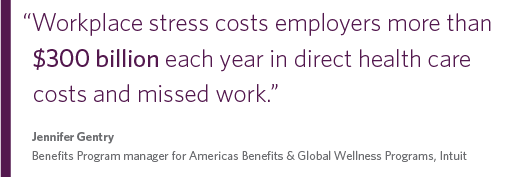
Ways to reduce employee stress in the workplace

Weight management, smoking cessation, healthy eating. These are all the usual suspects for employer wellness programs. But given its physical and emotional impacts, why is it that we hear so little about stress management?
As many employers are starting to recognize, managing stress is an important part of leading a healthy life and key to being a productive employee. Intuit is facing this challenge head-on with its new Well Minds program.
We interviewed Intuit’s benefits program manager for Americas Benefits & Global Wellness programs, Jennifer Gentry, about the motivation for Intuit’s focus on stress management. Here’s what she told us.
Q. Why is Intuit focused on stress and mental well-being?
Intuit listens to and cares for employees. We have an opportunity to be a leader in offering comprehensive wellness benefits, which includes mental well-being.
In our annual employee survey, many employees shared insight into their stress levels at work. Specifically, we learned that:
- 51% of employees who completed the health-risk assessment have an elevated stress level.
- 71% of employees are willing to take action to reduce their stress level.
Managing stress plays an important role in employees’ overall well-being, and it affects physical health. In fact, workplace stress costs employers more than $300 billion each year in direct health care costs and missed work.

Q. What is Well Minds?
We officially launched Well Minds in 2016. We describe it as a collection of offerings to help employees handle life’s challenges, build resilience, and ease stress.
Our priority is to focus on resiliency with a mindfulness approach, and we chose Headspace as our partner to help in that arena. A lot of the current data supports mindfulness practice to build resilience against stress at home and work. Studies also show that it strengthens the immune system and increases creativity, innovation, and problem solving—all of which have a direct impact on business results.
We also identified opportunities to weave mental well-being components into existing global programs. For example, we added meditation and mindfulness classes as reimbursable expenses under our Fit for Life program. We also added stress-reduction habits to our activity program through Virgin Pulse, so employees can get rewarded for stress-reducing activities like taking a walk, engaging in breathing exercises, and listening to calming music.
We continue to research programs to build up our offerings. There are some exciting additions on our horizon. Next up, we’ll be introducing two more global mindfulness-based programs through a partnership with Lantern and Whil.
Q. How are you engaging employees?
We want to incorporate Well Minds into our company culture. That’s why we’re working hard to communicate the programs and their value in multiple ways, year-round.
Here are some of the unique methods we used to reach out to employees during the program launch:
- Promoting Well Minds on our benefits website by:
- Tracking employee meditation minutes and updating the minutes each month. This appears to be driving engagement, as we’re observing a steady increase in minutes every month. Our Headspace participation has been higher than the average participation at other companies using Headspace.
- Including all mindfulness resources on a single web page, so employees don’t have to spend time searching for them. That page has had almost 5,000 views since the program was launched.
- Attaching “mindful moment” clings to conference room whiteboards. Each of our conference rooms features a different version, so employees never know what tip they’ll find when they head to their next meeting.
- Sending mailers to all employees’ homes.
- Displaying posters throughout our buildings.
I really feel that our cohesive communications approach during the program launch contributed to the results we’ve been seeing.
Q. What are you most excited about?
People may have different causes of stress, but the truth is that everyone feels stress. I’m passionate about helping employees learn techniques to manage their stress—whatever its cause—so that it doesn’t escalate and become a serious health issue. I’m thrilled that Intuit’s leadership sees this as a priority and an opportunity. We already have a successful and comprehensive physical wellness program. I’m excited that we could also become a leader in stress and mental well-being support, as well.
Thinking about launching a mindfulness program? Let us know, and we can help you build an effective communications strategy to support it.
Work with Us
We partner with organizations that value their people first. Let’s talk.

Jennifer Benz, SVP Communications Leader, has been on the leading edge of employee benefits for more than 20 years and is an influential voice in the employee benefits industry.
